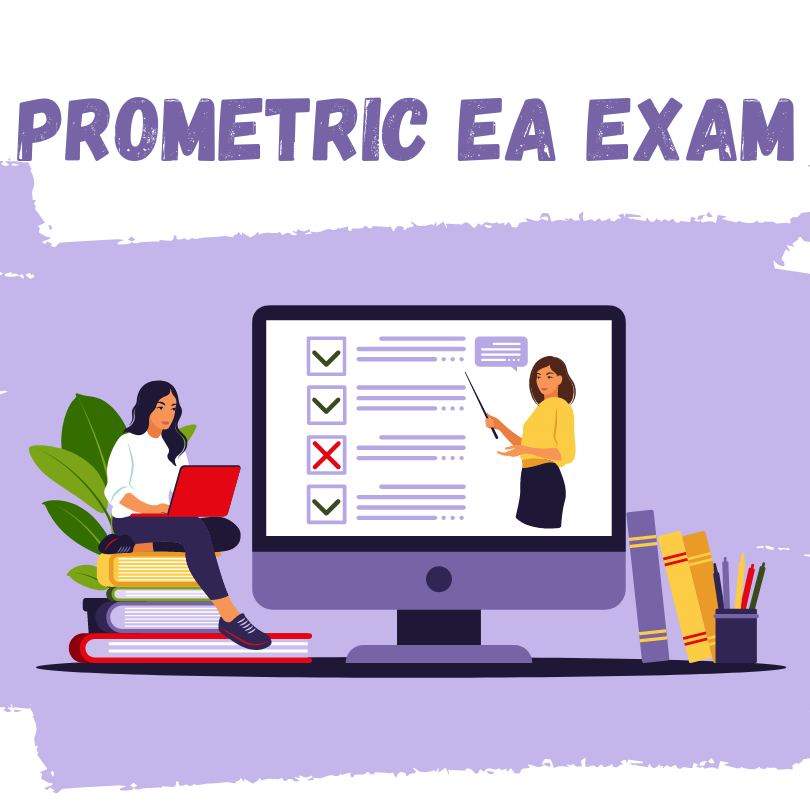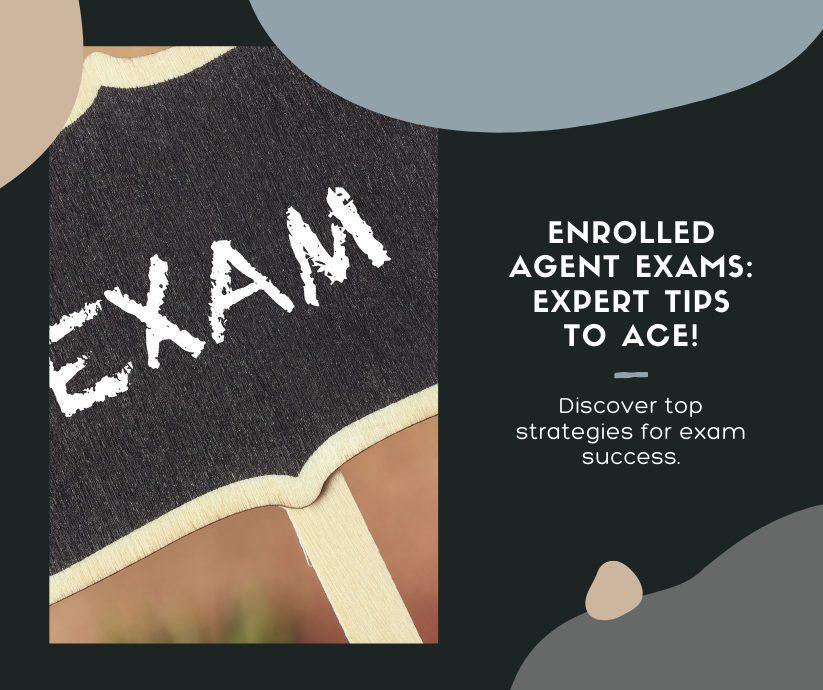Become an Enrolled Agent: Step-by-Step Guide
Passing the Enrolled Agent (EA) exam opens the door to...

Are you envisioning a successful career as an Enrolled Agent?
It’s a wise choice. Enrolled Agents hold esteemed status in the realm of taxation, carrying the privilege to represent taxpayers before the Internal Revenue Service. To achieve this distinction, one must demonstrate proficiency through the Special Enrollment Examination. Now, with access to premier study resources, your path to becoming an Enrolled Agent is more navigable than ever, leading to profound career opportunities and financial rewards.
The EA exam, administered by Prometric, consists of three separate parts, each focusing on distinct areas of tax law. Comprehensive in scope, this tripartite assessment verifies a candidate’s expertise across multiple tax-related domains, ensuring their preparedness for the diverse challenges in the field of taxation.
To navigate the exam successfully, understanding its format is crucial. The three parts are Individuals, Businesses, and Representation, Practices and Procedures, each structured with 100 multiple-choice questions. Candidates are allotted 3.5 hours to complete each section, a time frame that demands both accuracy and efficiency.
Adherence to Prometric testing protocols is imperative for all EA exam takers. The environment is standardized, with regulations in place to maintain the integrity of the examination process and the reliability of the results.
The Special Enrollment Exam (SEE) is divided into three comprehensive parts—Individuals, Businesses, and Representation, Practices and Procedures.
Each exam part takes 3.5 hours to complete, emphasizing the need for speed and accuracy under timed conditions.
Candidates must show proficiency in tax concepts relevant to their exam part, navigating through 100 multiple-choice questions effectively within the allotted time frame.
Deep knowledge in each segment is necessary—having a grasp of varying tax laws, filing requirements, and ethical standards—to excel and demonstrate the expertise of an Enrolled Agent.
Each part of the SEE consists of 100 multiple-choice questions, challenging candidates’ understanding of intricate tax matters. The exam format is conducive to testing theoretical knowledge, practical application, and the ability to interpret complex tax scenarios efficiently.
Questions range from basic recall to applied understanding. It is crucial to grasp the full breadth of tax concepts to succeed in navigating the diverse question types presented.
Most of the exam questions are situational, presenting candidates with real-life tax dilemmas to resolve. This requires not just memorization, but the ability to analyze and apply tax law effectively.
In addition, a limited number of questions are classified as experimental and do not count toward the final score. These questions are included to evaluate the potential inclusion in future exams.
Direct question formats may also appear, aiming to assess fundamental tax knowledge, making it essential to be well-versed in the relevant tax codes and regulations.
Finally, some items on the exam will be computational, requiring candidates to demonstrate their proficiency with numerical tax calculations. This type of question underscores the importance of not just knowing tax forms but also being fluent in their quantifiable aspects.
Upon deciding to pursue the designation of Enrolled Agent, candidates must register for the Special Enrollment Examination (SEE) through Prometric’s official platform. It is necessary to obtain a Preparer Tax Identification Number (PTIN) prior to registration, which can be acquired by applying online at the IRS website. After securing your PTIN, candidates may choose from available testing locations, dates, and times to schedule each part of the three-part examination.
To streamline the scheduling process, candidates should consider their individual preparation timeline and availability. The SEE is offered during an annual testing window, which typically runs from May 1 to the end of February. Ensure that you allow sufficient preparation time to optimally engage with study materials and practice exams from the EA Exam Test Bank to fortify your readiness.
Initiate registration after obtaining your PTIN.
The step that follows acquiring your PTIN is registration, which is accomplished through Prometric’s online system. With the PTIN in hand, you can access the scheduling facilities to select a convenient slot for each part of the Special Enrollment Examination. Understandably, arranging this aligns with your preparedness and personal timetable, as well as the availability of exam dates that are compatible with your study schedule. Bear in mind the relevance of diligent study to pass the exams proficiently.
Complete registration at Prometric’s website.
Access to the SEE is pivotal for your career progression. Ensure that you register for each part methodically—Individuals, Businesses, and Representation, Practices, and Procedures. Depend on your knowledge of tax matters to guide the selection of the exam part that best aligns with your expertise.
Diehard preparation is advised to ensure success.
Seamless onboarding facilitates a stress-free experience. After enrolling for the exam, immerse yourself in effective preparation by subscribing to the full EA Exam Course package, on sale for $299.99 from $399. This all-inclusive resource offers an extensive array of study aids designed to expedite your learning and pave the way for a triumphant outcome on the SEE.
Anticipate the satisfaction of your professional ascent.
Your quest to become a proficient Enrolled Agent moves solidly forward upon successful enrollment, culminating in the grandeur of passing the exams. Achieving EA status symbolizes not only your commitment to the tax profession but also unlocks a future filled with high-earning potential and dynamic career opportunities, ensuring your investment in the exam preparation is well worth the effort.
Selecting the optimal Prometric location and time slot requires strategic planning to align with your prep.
Desirable times fill up quickly; early registration facilitates the best scheduling options.
Contemplate the center’s atmosphere, comparing it with your ideal test-taking environment.
Approaching the EA Exam demands not just mastery over complex tax concepts but also a strategic study plan that leverages state-of-the-art tools and resources. The Full EA Exam Course package, available at a sale price of $299.99, provides an all-encompassing preparation experience that is essential for efficiently navigating the breadth of the exam’s content. It encompasses a comprehensive study guide, practice questions, and mock exams, all designed to fortify your understanding and test-taking skills.
Moreover, the Test Bank and Practice Exam bundle for $199.99 offers a cost-effective solution tailored to enhance your proficiency through rigorous practice. Its advanced technology aids in identifying your strengths and weaknesses, enabling a focused approach that can significantly reduce preparation time and increase the likelihood of first-attempt success.
Crafting a focused approach to EA exam preparation is paramount for success and efficiency.
Leveraging the Full EA Exam Course package is an astute investment in your career, ensuring access to superior resources that remain current and relevant across multiple test seasons.
The availability of instant access to study materials and a comprehensive pass guarantee underscores the dedication to your success as a future Enrolled Agent.
Practice exams bridge knowledge and application.
They are an indelible part of effective learning, representing a critical phase in exam preparation. Simulating actual test scenarios, they not only gauge your readiness but also build test-taking stamina and condition your response to the timing and pressure of the real exam. Ultimately, consistent practice with these exams elevates confidence and competence.
Employ these tests to solidify your grasp on the material.
Integrating practice exams in your study routine – particularly after extensive study sessions – helps cement knowledge and identifies lingering deficiencies. They function as diagnostic tools, offering insights into both the depth of your understanding and the effectiveness of your study strategies.
Your performance on practice exams can steer your final review.
As you digest feedback from these exams, you refine strategies and fill knowledge gaps. With the continual evolution of exam content, the Full EA Exam Course package, currently on sale from $399 for $299.99, integrates updated 2023 questions, ideal for ensuring you navigate the intricacies of the exam with finesse. This rigorous preparation can be the differentiator in your performance.
Once you successfully navigate the challenges of the Enrolled Agent exam, a world ripe with opportunities opens up before you. Mastery of complex tax situations now in hand, you’re authorized to represent taxpayers, offer advice on tax matters, and undertake tax return preparation with the assurance and authority that comes from being a federally-licensed professional. This is just the beginning of your journey as an Enrolled Agent, continuously navigating the labyrinth of tax laws as they evolve, ensuring compliance and optimization for each client.
Having the designation of an Enrolled Agent does not signal an end, but rather, the commencement of a professional voyage marked with ongoing education and evolving responsibilities. Embrace your new status by joining a network of tax professionals, actively participating in the community, and keeping abreast of the latest tax law changes. Here, your commitment to professional growth and expertise not only adds value to your clients but furthers the reputation and standards of excellence within the field of tax representation.
Becoming an Enrolled Agent requires successful navigation through the IRS enrollment process post-examination.
With your certificate in hand, uphold the professional and ethical standards expected of an Enrolled Agent to maintain this distinguished role.
Enrolled Agents (EAs) possess a unique standing in the tax world, with their services in high demand. Career opportunities for EAs are remarkably varied and broad, allowing for significant professional progress and job satisfaction.
Public accounting firms often seek the specialized tax expertise that EAs provide, effectively positioning them as essential players in the field. In these settings, EAs collaborate with accountants and attorneys, adding value through their in-depth knowledge of tax regulations and compliance matters.
The ability to represent clients before the IRS opens additional avenues for EAs within the realms of tax advocacy and dispute resolution. This representation is a critical service that EAs uniquely offer, making them indispensable during audits, appeals, and collection proceedings.
Entrepreneurial EAs can leverage their certification to launch independent tax practices, offering a suite of services from tax preparation to strategic planning. Such autonomy invites a wealth of potential for EAs willing to venture into self-employment and business ownership.
For those seeking expansive career mobility within the tax profession, earning the EA designation creates a pathway to heightened earnings and diverse professional engagements. Hence, becoming an EA can significantly enhance one’s career trajectory and professional opportunities.
The Enrolled Agent (EA) exam is a challenging endeavor that requires diligent preparation and a strong understanding of tax regulations and practices.
The EA exam has a comprehensive syllabus that covers various aspects of tax law, including individual taxation, business taxation, and ethics. Candidates are required to have a deep knowledge of the U.S. tax code, including its ever-changing provisions and regulations.
To successfully pass the EA exam, candidates need to invest significant time and effort into studying and understanding the complex tax concepts. It requires a commitment to continuous learning and staying updated with the latest tax laws and regulations.
However, with proper preparation and a focused study plan, the EA exam is definitely achievable. Many candidates have successfully passed the exam and obtained their EA designation, which is a testament to their dedication and hard work.
It is important to note that the difficulty of the EA exam can vary depending on an individual’s prior knowledge and experience in the tax field. Some candidates may find certain topics more challenging than others, but with determination and perseverance, they can overcome any obstacles and succeed in their exam.
Overall, while the EA exam may be considered difficult due to its extensive coverage of tax regulations and complex concepts, it is not an insurmountable challenge. With thorough study, practice, and a solid understanding of the subject matter, candidates can confidently approach the exam and achieve their EA designation.
Test fees for the Prometric EA exam are non-refundable and non-transferable. A fee of $203 per part must be paid at the time of appointment scheduling. It’s important to note that these fees are subject to change, so it’s recommended to check the Prometric website or contact the testing center for the most up-to-date information on exam fees.
In addition to the exam fees, there may be other costs associated with preparing for the exam, such as study materials, review courses, and practice exams. These additional costs are not included in the exam fee but are important for adequately preparing for the exam.
It is important to note that the cost of the exam is subject to change, and it is recommended to consult the Prometric website or contact the testing center directly for the most up-to-date and accurate information on exam fees.
To become an Enrolled Agent (EA), you have a three-year timeframe to pass all three parts of the EA exam. This means that once you successfully pass the first part, you must pass the remaining two parts within three years to become an EA. It’s important to plan your study and exam schedule accordingly to ensure you meet this requirement and achieve your goal of becoming an Enrolled Agent.
The Prometric EA exam is an examination administered by Prometric, a leading provider of testing and assessment services. It is specifically designed for individuals who wish to become Enrolled Agents (EAs), which are tax professionals authorized to represent taxpayers before the Internal Revenue Service (IRS).
The exam consists of multiple-choice questions that assess the candidate’s knowledge and understanding of various tax topics, including federal tax law, tax preparation and planning, ethics, and representations. It is a comprehensive examination that covers a wide range of tax-related subjects, ensuring that EAs have a solid understanding of the tax code and its applications.
The Prometric EA exam is a computer-based test that allows candidates to answer questions and submit their responses electronically. The exam is timed, with a specified number of minutes allocated for each section. Candidates must demonstrate their knowledge and problem-solving skills by selecting the most appropriate answer from the provided options.
Successful completion of the Prometric EA exam is a significant milestone for individuals aspiring to become Enrolled Agents. It demonstrates their competence and proficiency in tax matters, enabling them to provide valuable services to taxpayers and effectively represent their interests before the IRS.
The Prometric EA exam can be taken at various authorized testing centers across the United States and all around the world. These centers are approved by Prometric, the organization responsible for administering the exam.
To find a Prometric testing center near you, you can visit the Prometric website and use their online search tool. Simply enter your location or zip code, and the website will provide you with a list of nearby testing centers.
When scheduling your exam, it’s important to note that the EA exam is available throughout the year. However, you will need to check the availability and schedule your exam appointment in advance to secure your preferred date and time.
Overall, the Prometric EA exam can be taken at authorized testing centers across the United States. With the availability of multiple testing locations, you can choose a center that is convenient for you and schedule your exam appointment accordingly.
Rescheduling your Prometric EA exam is possible. In 2016, Prometric, the testing provider, implemented a new rescheduling policy. Now, it is entirely feasible to reschedule your exam up to three days before your originally scheduled date. However, it is important to note that rescheduling fees may apply in certain cases.
To reschedule your exam, you’ll need to log into your Prometric account and access the scheduling section. From there, you’ll be able to select a new date and time that works better for you. It’s crucial to prioritize scheduling your new exam as soon as possible to ensure availability, as popular dates and times tend to fill up quickly.
Keep in mind that there may be fees associated with rescheduling your exam. The amount and specific details of these fees can vary, so it’s essential to review Prometric’s rescheduling policy and any applicable terms and conditions. By familiarizing yourself with these policies, you can make an informed decision about rescheduling your Prometric EA exam.

Passing the Enrolled Agent (EA) exam opens the door to...

The journey to becoming an Enrolled Agent is both challenging...

Imagine gazing at a promising future as a tax professional.However,...

Achieving the status of an Enrolled Agent is a significant...

Are you envisioning a successful career as an Enrolled Agent?It's...